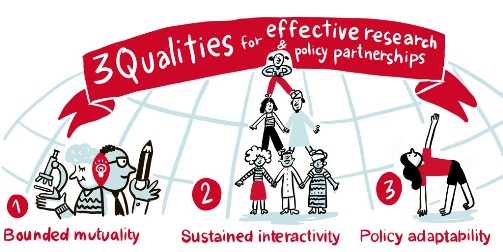At a time of increasing scrutiny of UK Aid-funded university research, leaders of UK research councils and the Department for International Development (DFID) came together at the Wellcome Collection on 8 July, to discuss how to maximise the impact of the UK’s investment in interdisciplinary research for international development.

Co-hosted by DFID, the Economic and Social Research Council (ESRC), UK Research and Innovation (UKRI), UK Collaborative on Development Research (UKCDR) and The Impact Initiative, the event will draw from the IDS Bulletin: ‘Exploring Research and Policy Partnership for Societal Change’ – a special issue produced with the Impact Initiative. The IDS Bulletin – IDS’ flagship publication – is an open access, peer-review journal exploring emerging international development challenges.
Diana Dalton, Deputy Director, Research and Evidence Division, DFID writes in her foreword to the special issue: “DFID has, too, long recognised that the deployment of advances in science, social science, technology, and innovation is a critical enabler for development progress. Our strategic investment in research and the delivery of global public goods has delivered high returns, saved millions of lives and, equally importantly, informed policy and delivery design by development actors on what works (and what does not).”
The participants were donors, leading development researchers and southern policy partners. Panellists included:
- Charlotte Watts, Chief Scientific Advisor, DFID (delivering the keynote speech)
- Diana Dalton, Deputy Director of Research Evidence Division, DFID
- Anderson Gitonga, CEO of United Disabled Persons of Kenya
- Mushtaque Chowdhury, Vice Chair, BRAC.
A series of panels presented case studies and critical discussion around what makes successful research–policy partnership and innovations in brokering research knowledge across multiple projects and programmes. Learning from the event will have implications for how research calls are conceptualised and designed and how programmes are developed, implemented and evaluated.
The impact of the ESRC-DFID Strategic Partnership’s portfolios
This special issue focusing on research-policy partnerships grew out of the Impact Initiative seeking to increase the uptake, impact and learning from the ESRC-DFID’s Joint Fund for Poverty Alleviation Research and the Raising Learning Outcomes in Education Systems Research Programme.
The case studies included in the issue range from attempts to leverage evidence around the lived experiences of pastoralists in Ethiopia, the influencing of regional strategies to improve health systems in Southern Africa to promoting more inclusive education in India and Uganda.
It particularly highlights the important role that DFID has played in supporting research-policy partnerships through the ESRC-DFID Strategic Partnership encompassing policy-relevant research on health systems, inclusive education, disability, gender, conflict-affected states and poverty reduction in Africa and South Asia.
It also profiles the impact of the diverse portfolios of research funded jointly by ESRC-DFID and makes the case for why investment in interdisciplinary research is so vital for international development.
A series of impact stories on ESRC-DFID funded projects have also shown the importance of supporting research with partners in different development settings, and the relevance for policymakers.
- The ‘Pregnancy Termination Trajectories in Zambia’ project investigated the complex and challenging process of how to provide abortion care. As a direct result, the research findings have been incorporated in the latest Standards and Guidelines for Comprehensive Abortion Care in Zambia. The Zambian lead for the project presented the findings to the Resident Doctors Association of Zambia in 2015, where the guest of honour was the Deputy Minister of Health, who subsequently invited the partner to present at the Senior Management meeting of the Ministry of Health.
- The ‘Insecurity and Uncertainty’ project, focused on understanding marginalised young people’s living rights in fragile and conflict-affected situations in Nepal and Ethiopia. In Ethiopia, the former Ministry of Youth and Sports (now the Ministry of Women, Children and Youth) revised the draft 2018 National Youth Status Report and Indicators of Ethiopia based on findings from this research.
This event showcased other innovative examples of how the UK’s investment in research policy partnerships is helping to address the challenges faced by developing countries. Ultimately, this learning and critical reflection will create opportunities to identify ways forward and new approaches to building effective research partnerships in order to increase the impact of UK-funded research.